Both of these reviews appeared in the July 1975 issue of Monthly Film Bulletin (vol. 42, no. 498). –- J.R.
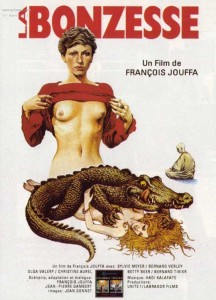
Bonzesse, La
France, 1974
Director: François Jouffa
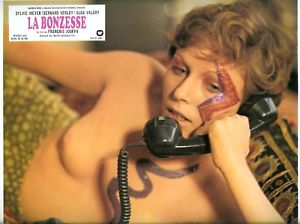 Bored with her life, Béatrice goes to work in Mme. Renée’s upper-class Parisian brothel, where she is given the name of Julie and quickly initiated into the tricks of the trade. Flashbacks suggest that she was sexually abused by her stepmother, and grew up believing that the life bf a courtesan was glamorous. On her second day at work, she is attracted to a client, Jean-François, a wealthy advertising man who chooses not to have sex with her but asks her for a date that evening. She accepts and winds up living at his flat, but he repeatedly avoids having sex with her. In desperation, she resumes work at the brothel in the daytime without telling him, then leaves him one night to go home with her friend Martine and her boyfriend. As she gradually saves up enough money to fly to Ceylon — where she hopes to attain spiritual peace — she becomes increasingly depressed by the grotesque needs of the clients who come to the brothel, the jealousy of a fellow worker, and the overall sordidness and sadness of the place. Read more
Bored with her life, Béatrice goes to work in Mme. Renée’s upper-class Parisian brothel, where she is given the name of Julie and quickly initiated into the tricks of the trade. Flashbacks suggest that she was sexually abused by her stepmother, and grew up believing that the life bf a courtesan was glamorous. On her second day at work, she is attracted to a client, Jean-François, a wealthy advertising man who chooses not to have sex with her but asks her for a date that evening. She accepts and winds up living at his flat, but he repeatedly avoids having sex with her. In desperation, she resumes work at the brothel in the daytime without telling him, then leaves him one night to go home with her friend Martine and her boyfriend. As she gradually saves up enough money to fly to Ceylon — where she hopes to attain spiritual peace — she becomes increasingly depressed by the grotesque needs of the clients who come to the brothel, the jealousy of a fellow worker, and the overall sordidness and sadness of the place. Read more
From American Film (May 1979) –- a collaborative venture with Carrie Rickey, written during the year when we were flat mates living on Soho’s Sullivan Street. I assume that its main interest now is as a sort of time capsule, and I apologize if some of the photos are anachronistic, which seems likely. -– J.R.
With Broadway theaters threatening to raise their top prices to thirty-five dollars a seat, the place where most natives of New York City go is to the movies. Not, by and large, to the ritzy East Side movie houses which charge five dollars a head, but to the neighborhood cinemas charging half as much — many of them featuring movies hard to find outside of Manhattan.
A filmgoer visiting the city who plans to see the same movies he can find anywhere else can expect a long line and the hurried ambience of a fast-food restaurant. But if he’s determined to sample fare that’s more adventurous and unusual, he should seek out one of the independent showcases that have sprung up in New York over the past decade.
Here, more often than not, he can talk to the filmmaker after the screening and share the movie with a community of regulars. Read more
From Sight and Sound (November 1991). -– J.R.
Play it again
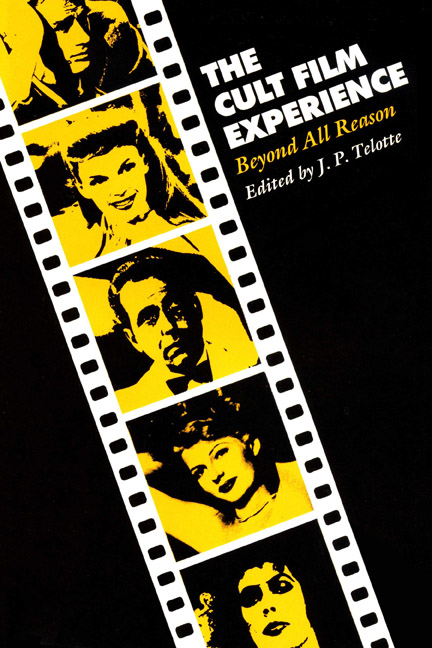
________________________________________________________
Jonathan Rosenbaum
________________________________________________________
The Cult Film Experience: Beyond AII Reason
J. P. Telotte (ed), University of Texas Press,
$36, 218 pp.
Jonathan Rosenbaum
________________________________________________________
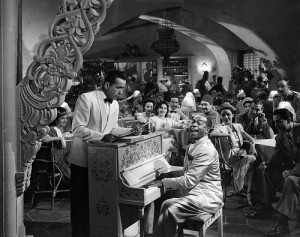
“It will be a sad day when a too smart audience will read Casablanca as conceived by Michael Curtiz after having read Calvino and Barthes”, Umberto Eco wrote in 1984. “But that day will come”. J. P. Telotte’s collection reminds us that Eco’s sad day is already well behind us — though it turns out to be Eco himself rather than Calvino or Barthes who provides the principal theoretical back-up.
Serious analysis of film cults can be traced back to a 1932 essay by Harry Alan Potamkin, but you won’t find Potamkin’s name in Telotte’s index. Indeed, apart from some cursory acknowledgments, the book fosters the impression that the arrival of film cults coincided with the burgeoning of film studies in the early 70s. This suggests that academic film study is itself an unacknowledged form of cult activity predicated on repeated viewings by a fetishistically inclined minority audience which reappropriates the film in question for its own specialized purposes.
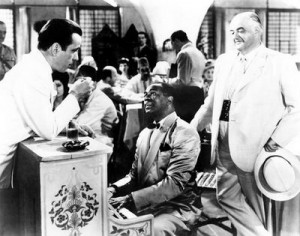
One of these purposes is institutional, which accounts for the academics’ frequent recourse to the self- validating and ahistorical term ‘classical’ to dignify both mainstream movie-making and established film theory. Read more
 Bored with her life, Béatrice goes to work in Mme. Renée’s upper-class Parisian brothel, where she is given the name of Julie and quickly initiated into the tricks of the trade. Flashbacks suggest that she was sexually abused by her stepmother, and grew up believing that the life bf a courtesan was glamorous. On her second day at work, she is attracted to a client, Jean-François, a wealthy advertising man who chooses not to have sex with her but asks her for a date that evening. She accepts and winds up living at his flat, but he repeatedly avoids having sex with her. In desperation, she resumes work at the brothel in the daytime without telling him, then leaves him one night to go home with her friend Martine and her boyfriend. As she gradually saves up enough money to fly to Ceylon — where she hopes to attain spiritual peace — she becomes increasingly depressed by the grotesque needs of the clients who come to the brothel, the jealousy of a fellow worker, and the overall sordidness and sadness of the place. Read more
Bored with her life, Béatrice goes to work in Mme. Renée’s upper-class Parisian brothel, where she is given the name of Julie and quickly initiated into the tricks of the trade. Flashbacks suggest that she was sexually abused by her stepmother, and grew up believing that the life bf a courtesan was glamorous. On her second day at work, she is attracted to a client, Jean-François, a wealthy advertising man who chooses not to have sex with her but asks her for a date that evening. She accepts and winds up living at his flat, but he repeatedly avoids having sex with her. In desperation, she resumes work at the brothel in the daytime without telling him, then leaves him one night to go home with her friend Martine and her boyfriend. As she gradually saves up enough money to fly to Ceylon — where she hopes to attain spiritual peace — she becomes increasingly depressed by the grotesque needs of the clients who come to the brothel, the jealousy of a fellow worker, and the overall sordidness and sadness of the place. Read more 



